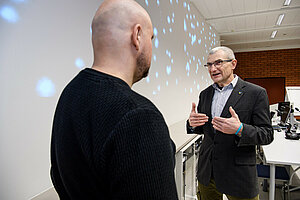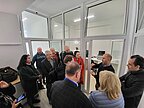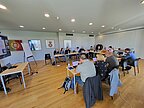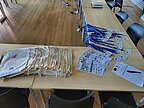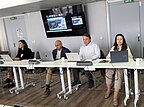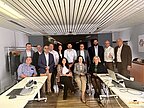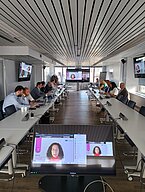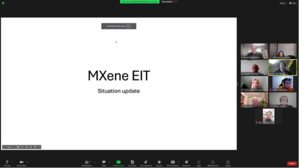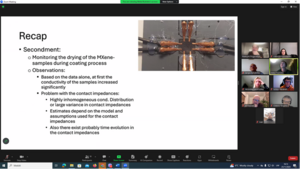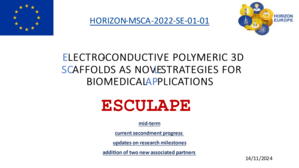HORIZON-MSCA-2022-SE-01 (MSCA Staff Exchanges 2022) project “ELECTRO-CONDUCTIVE POLYMERIC 3D SCAFFOLDS AS NOVEL STRATEGIES FOR BIOMEDICAL APPLICATIONS” is running successfully! A great thanks to all ESCULAPE project partners for participation and contribution to the ”Nanomaterials: Applications & Properties” (IEEE NAP 2024 Riga, LATVIA, Sep. 8-13, 2024) conference! The fruitful discussions of the obtained results during the ESCULAPE project round table, along with the productive meetings throughout the conference sessions, will lead to the successful achievement of the project’s objectives.
Biomaterials research moves forward despite the shadows cast by the war in Ukraine.
Nowadays, Kyrylenko is engaged in research collaboration with Professor Seppänen. Both their universities are members of the ESCULAPE consortium, together with universities and companies from many other countries. The main task of the project is to explore new graphene-like 2D nanomaterials, MXenes, and use them to design conductive polymer scaffolds, e.g., tissue engineering.
"MXenes are new and very promising nanomaterials that are being intensively explored in many fields of science and technology. MXenes have a very thin, two-dimensional structure, somewhat similar to graphene, but with more attractive features. Biomedical properties of MXenes have been studied very little so far," Kyrylenko explains.
"MXenes consist of atomic layers of transition metals, such as titanium with carbon or nitrogen. They conduct electricity better than graphene, and they are hydrophilic, which makes the material more versatile than graphene. However, it is not yet clear how different physical and chemical conditions affect the material’s electrical conductivity. Exploring that is one of the main objectives of our project," Seppänen adds.
"MXenes are completely new materials for our research group."
The requirements set for biomaterials are strict. They must be non-toxic, recyclable and, above all, biocompatible with human tissues, if they are to be used in medical applications.
Initiating the HORIZON-MSCA-2022-SE-01 Project ESCULAPE 101131147, the kick-off meeting took place in Porto, Portugal, from 21 to 23 November 2023. Representatives from Latvia, Lithuania, Poland, France, Czech Republic, Portugal, Finland, Ukraine, and Brazil attended the meeting.
This gathering signifies the official commencement of our collaborative journey, providing an opportunity for all team members to align on objectives, expectations, and roles. The primary purpose of the meeting is to launch the ESCULAPE project, introducing key stakeholders and team members, reviewing project goals and milestones, and outlining the project plan.
The ESCULAPE project is geared towards fostering robust interdisciplinary collaboration, with a focus on advancing research and innovation in biomaterials, polymer science, nanotechnology, tissue engineering, microbiology, and medicine. The ultimate aim is to pioneer new solutions in medical engineering for regenerative medicine and wearable electronics.
Dr. Viktoriia Korniienko from the Institute of Atomic Physics and Spectroscopy of the University of Latvia presented a lecture titled "Biomaterials – Production and Application" as part of the project "Electro-Conductive Polymeric 3D Scaffolds as Novel Strategies for Biomedical Applications" under the HORIZON-MSCA-2022-SE-01 ESCULAPE 101131147. Her insightful contribution shed light on groundbreaking strategies for biomedical applications.
The lecture was a pivotal component of a broader online series conducted from 13 to 27 December 2023 for the chemistry students at Sumy State University, focusing on the creation and research of materials in biomedicine, which is an invaluable educational opportunity. These sessions, dedicated to the creation and exploration of materials in the field of biomedicine, aimed to equip students with the latest methodologies in material creation, study, and application for biomedical purposes.
The lectures underscored the importance of interdisciplinary cooperation and successful implementation of international grants and projects. This initiative stands as a testament to the institution's dedication to providing students with a comprehensive and forward-looking education.
Dr. Viktoriia Korniienko participated in the online webinar "Marie Skłodowska-Curie Staff Exchanges: How to Broaden Your Horizon?", organised by the National Contact Points of Latvia, Lithuania, Estonia, and Poland on 10 October 2023. As the coordinator of the Marie Sklodowska Curie Actions Staff Exchange project "Electro-conductive polymeric 3D scaffolds as novel strategies for biomedical applications" (ESCULAPE), Dr. Korniienko shared invaluable insights and experiences. Her focal point revolved around the intricacies of proposal preparation, shedding light on the meticulous process that goes into crafting successful project proposals.
The collaborative efforts of the Latvian, Lithuanian, Estonian and Polish National Contact Points made this webinar a beacon of knowledge and a platform for researchers to broaden their horizons. The contribution of Dr. Viktoriia Korniienko not only illuminated the potential of ESCULAPE, but also inspired aspiring researchers to embark on their own journeys of scientific exploration and collaboration.
The ESCULAPE Midterm Meeting was held on April 24–25, 2025, at Inserm in Paris, with both in-person and online participation via Zoom. Over the two-day event, project partners came together to present the current status of each work package, share experiences from secondments, and address key aspects of project management, dissemination, and impact. The agenda featured presentations by WP leaders, sessions on training and networking, and a dedicated meeting with the REA representative. On April 25, closed discussions among project partners focused on challenges in the implementation of WP2 and WP3, as well as on refining the publication and dissemination strategy. The meeting concluded with final remarks and a social program, strengthening collaboration and setting the course for the next phase of the project.
Thank you to all participants, speakers, and organizers for your valuable contributions and active engagement throughout the meeting.
Regular Partners’ Meeting for project implementation monitoring (November, 25th 2024)
The partners of the ESCULAPE project held a regular meeting to monitor the project's implementation, review progress, and discuss key developments.
The meeting opened with a review of ongoing activities, focusing on the implementation of work packages and the achievement of planned milestones. Partners shared updates on their respective tasks, highlighting successful outcomes and addressing any challenges encountered. These discussions allowed for the identification of areas requiring additional attention to ensure alignment with project goals.
The results of the electrical characterization (electroconductivity) of the electrospun mats, measured using methods of impedance spectroscopy, were discussed during the meeting. Key findings highlighted the mats' conductivity levels and their potential implications for the intended applications, providing valuable insights into their performance and optimization needs.
In conclusion, the meeting served as a productive forum for monitoring project implementation and strengthening partner coordination. The discussions reaffirmed the partners’ commitment to achieving the project’s objectives and provided a clear path forward for the next phase of activities.
On November 14th,2024 the partners of the ESCULAPE project convened to review the progress made during the first year, assess the status of secondments, and discuss amendments regarding the involvement of two associated partners.
The partners reviewed the planned secondments for the upcoming phases and made necessary adjustments to ensure alignment with the project’s overall objectives. Emphasis was placed on ensuring effective coordination and maximizing the benefits of these exchanges for all involved parties. A significant portion of the meeting was dedicated to discussing amendments related to the involvement of two associated partners. The partners agreed on the necessary steps to finalize these amendments, with a clear timeline set for submission. The coordinator was tasked with preparing and submitting the amendment request by the agreed deadline.
Additionally, the mid-term meeting's date and location were discussed. This meeting will serve as a critical milestone for evaluating progress and planning for the next project phase. In conclusion, the meeting provided an opportunity for partners to align their efforts and plan strategically for the coming phases. Progress was reviewed, plans were refined, and next steps were clearly defined, ensuring continued collaboration and project success.

 CONFERENCE
CONFERENCE





